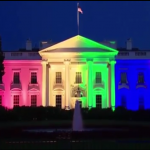And it is what causes me to think, furthermore, that in spite of the wrong and destructive narratives that are told and retold in this country, and in spite of the widespread harm that ignorant views wreak onto the world, and in spite of the influence of the powerful in their beatings down of the oppressed, and in spite of the fact that we are all (in some way or another) despised and seen as in the wrong or “sinners” by one of our neighbors, there is a reason to embrace existence and life and humanity.
I said before that there is a danger in the concept of grace in that it can make us complacent to the ongoing injustices in our society. Indeed, I expressed concern about that in my response to the Dylann Roof bond hearing, where a murderer was forgiven by the victims. I continue to think that mere forgiveness will not move us forward – examining the causes within the painful wound of ongoing racism in this country is of paramount importance, and the concept of forgiveness gets in the way of that. As I said a few paragraphs ago, there is an added danger that the concept of grace will excuse the wrong people and have us accepting injustice and inequality in a very unhealthy manner.
But “grace” as defined by Obama that afternoon at the AME church was a different. It was a grace you had to fight for. It was defined as justice and equality. And it was hammered home with the authority of the concept of God. It was the realization that in spite of humanity, there is still a reason to hope that there will be glimpses of times we do realize justice and equality.
Grace, for Obama during that Eulogy, was exhibited in our ability to see, in the midst of tragedy and racism, that the Confederate flag should come down in the United States.
Grace was the refusal to accept the Confederate flag was flying. That was, as Obama would have put it, part of our nation’s evil or “sin.” Grace was not the fact that nine people died in a church. That, too, was a deeply destructive evil, or, in Christianeze, “sin.” Grace was rather, according to Obama in that Eulogy, the fact that in that tragedy, those of us who were blind to the pain the Confederate flag inflicted on the eyes, minds, and hearts of millions of Americans were awakened and saw the flag needed to come down.
As Obama put it,
“By taking down the flag, we express God’s grace.”
Grace as defined by Obama was in the ability to see hope in the face of what many would call hopelessness – not forgiveness from arbitrary sin, but the ability of people to, in the face of injustice that created broken down communities, work hard day after day to fight the wrongs of racism that were rampant in their communities. It was found in Reverend Pinckney, according to Obama, in the following way:
“As a senator, [Reverend Clementa Pinckney] represented a sprawling swathe of low country, a place that has long been one of the most neglected in America, a place still racked by poverty and inadequate schools, a place where children can still go hungry and the sick can go without treatment — a place that needed somebody like Clem.
“His position in the minority party meant the odds of winning more resources for his constituents were often long. His calls for greater equity were too-often unheeded. The votes he cast were sometimes lonely.
“But he never gave up. He stayed true to his convictions. He would not grow discouraged. After a full day at the Capitol, he’d climb into his car and head to the church to draw sustenance from his family, from his ministry, from the community that loved and needed him. There, he would fortify his faith and imagine what might be.
“Reverend Pinckney embodied a politics that was neither mean nor small. He conducted himself quietly and kindly and diligently. He encouraged progress not by pushing his ideas alone but by seeking out your ideas, partnering with you to make things happen. He was full of empathy and fellow feeling, able to walk in somebody else’s shoes and see through their eyes….
“He embodied the idea that our Christian faith demands deeds and not just words, that the sweet hour of prayer actually lasts the whole week long, that to put our faith in action is more than just individual salvation, it’s about our collective salvation, that to feed the hungry, clothe the naked and house the homeless is not just a call for isolated charity but the imperative of a just society.”
In bringing salvation out of the individual goal of heaven and giving it a material (instead of after-death) reality, Obama made the grace in the salvation story not the ticket to heaven bestowed by God, but the actual deeds of people here on earth to make a better society in spite of long, dreary answers and the hard work that was needed to work for change.
Instead of indicating that only Christians were saved, he turned the salvation story into a metaphor for the fact that we’re all just fellow human beings here on earth – including the most powerful among us – and that for humanity to find it’s best self, we have to make life better for all humanity, not the select few.
And even though I wouldn’t use that metaphor, I heartily agree, as a secular humanist, with the concept. And I can understand how a black church bludgeoned by years of Christian bigotry and racism would want to use the very tools of its oppression into tools for equality and justice – or, in their words, “salvation.”
That is to say…when Obama reached the end of his speech, and emphasized that each of the individuals who died found that grace – he was not giving black people a pacifier of religion, as versions of Christianity of the past are so often wont to do. He was, rather, invoking a grace that would be realized through the acts of people who had skin on them, not through a real God. And I can understand, however controversial this may be among my fellow atheists, that the personification of the community of people fighting for equality and justice in spite of the pain and hardship along the way is a source of great comfort for a great many people – a source of hope.
So I’m still against the metaphors as reality, and I think that by even saying them you are running the risk of very dangerous, destructive concepts. And I think that those who have Obama’s understanding of Christianity (which has some problems with it, still) are extremely small in number, thus ensuring that the voicing of this liberal, progressive form of Christianity might be misunderstood. But I do understand, as I’ve said previously, the decision to use these concepts to change them, even if I will not use them myself.
But just the same…in the privacy of my home, when Obama got to the part where he sang “Amazing Grace,” I was not my usual angry, antitheistic self. I felt, instead, deeply encouraged.
And that’s saying something. It’s been a long, long time since a sermon’s done that for me. It was somewhat, um….Amazing.













